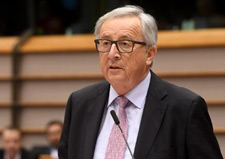Commission presents White Paper on the future of Europe: Avenues for unity for the EU at 27

date: 02/03/2017
In preparation for the Rome Summit of 25 March that will mark the 60th anniversary of the EU, the European Commission has published a White Paper on the Future of Europe. The white paper, which Commission President Jean-Claude Juncker presented before the European Parliament on 1 March, sets out the main challenges and opportunities for Europe in the coming decade. It presents five scenarios for how the Union could evolve by 2025 depending on the path chosen. The scenarios cover a range of possibilities and are illustrative in nature. They are neither mutually exclusive, nor exhaustive. In scenario 1, “Carrying On”, the EU27 focuses on delivering the positive reform agenda agreed upon by all 27 Member States in 2016. In scenario 2, “Nothing but the Single Market”, the EU is gradually re-centred on the single market while scenario 3, “Those Who Want More Do More”, allows willing Member States to do more together in specific areas. In scenario 4: “Doing Less More Efficiently” the EU focuses on delivering more and faster in selected policy areas, while doing less where it is perceived not to have an added value. Finally, in Scenario 5, “Doing Much More Together”, Member States decide to share more power, resources and decision-making across the board. To encourage debate, the Commission, together with the European Parliament and interested Member States, will host a series of “Future of Europe Debates” across Europe’s cities and regions over the coming months. The Commission will also publish a series of reflection papers on various topics, including one on the deepening of the Economic and Monetary Union (EMU). First conclusions could be drawn at the December 2017 European Council in order to decide on a course of action to be rolled out in time for the European Parliament elections in June 2019.
